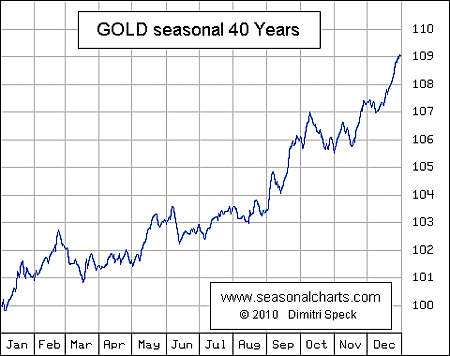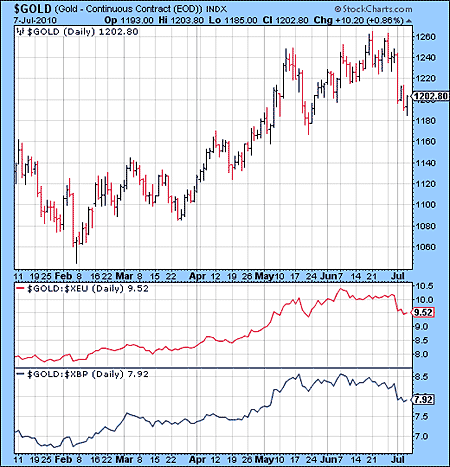Will economic austerity kill gold's bull market?
The gold price recently broke out to new all-time highs. But since then, it's seen a big correction. So does this have anything to do with the dawn of a new 'age of austerity', or is it nothing more than a healthy pull-back? Dominic Frisby explains.
Get the latest financial news, insights and expert analysis from our award-winning MoneyWeek team, to help you understand what really matters when it comes to your finances.
You are now subscribed
Your newsletter sign-up was successful
Want to add more newsletters?
On 21 June gold broke out to new all-time highs above $1,260 an ounce. It pulled back, but then on 28 June it moved briefly above $1,260 again. Ten days later it was down some $80, flirting with the $1,185 mark. That's quite a correction and it's concerned a lot of people, so I wanted to address it in today's Money Morning.
Is this anything more than a "healthy pull-back"? Let's have a look...
A summer pull-back for gold is normal
The first thing I would say is that it is perfectly normal for gold to pull back in the June-August timeframe. The chart below (courtesy of Dimitri Speck) shows the seasonal tendencies of gold, based on its price action over the last 40 years.
Try 6 free issues of MoneyWeek today
Get unparalleled financial insight, analysis and expert opinion you can profit from.

Sign up to Money Morning
Don't miss the latest investment and personal finances news, market analysis, plus money-saving tips with our free twice-daily newsletter
Don't miss the latest investment and personal finances news, market analysis, plus money-saving tips with our free twice-daily newsletter
As you can see, in the summer gold tends to languish - at the very least - and, as a consequence, the June-August timeframe is usually one of the best times of year to buy.

My second observation is that gold's June high above $1,260 was a function of US dollar weakness. Against the euro and the pound, gold made its high on 7 June - exactly according to Speck's seasonal pattern - and then made a lower high on 21 June.
This next chart shows the gold price since the start of 2010, then beneath (in red) gold against the euro, and beneath that (in blue) gold against the pound.

Is the case for gold weakening?
As we noted in Money Morning the other day, the European Central Bank has effectively tightened monetary conditions recently, and this has been responsible for some of the euro's strength in recent weeks. Meanwhile the pound, under our new austere government, has been a marvel. This semblance of fiscal sanity returning to both sides of the Channel will have weakened the case for gold.
But therein lies the question. Are we really at the dawn of a new age of austerity? Has Austrian economic thinking replaced the Keynesian addiction to government spending? If we are, and it has, then there is no longer such a compelling case for gold.
At MoneyWeek, we don't make judgements based on party politics. We disliked Gordon Brown because he made bad decisions for the country, not because he was a member of the Labour party.
But I have to say I'm a big fan of the steps this government are taking to cut wasteful spending and improve efficiency. I like the fact that they are attempting to lighten the debt load and set the example of living within your means.

- Why UK property prices are going to fall 50%
- When it will be time to get back in and buy up half price property
However, one must not get wedded to this new 'austere' moniker. It's early days. There has been no crisis yet. We have to wait and see how they will react when it comes - as sure enough it will. How much mettle will they really have, when push comes to shove?
Meanwhile, we are still in an environment of negative real interest rates. Inflation will come down a little as a result of sterling's recent strength, but annual consumer price index (CPI) inflation is still above 3% and retail price index (RPI) inflation above 5%, while the Bank of England rate is sitting at 0.5%. And neither of those are adequate measures of inflation, as they do not take asset prices into account. As long as savers continue to make a loss, gold should thrive.
In the UK we still have gigantic debts to overcome. We are still overly dependent on the revenue generated by the City, which could quickly diminish in the event of another stock market rout. Our day of reckoning still lies ahead.
But look across the Atlantic and there is no sign of any attempts to get spending in check. In Illinois, for example, which is virtually bankrupt, Fox News reported on Wednesday that "40,000 state workers are to get 14% payraises." This is just one example of many. Money that people don't have is still being recklessly spent. 'Helicopter' Ben Bernanke still believes in his printing press (and Goldman Sachs this week issued a call to him to turn it back on).
Meanwhile, judging by the ever-increasing deficit, Barack Obama seems to think the US can spend its way out of this. The US will have a much greater impact on the gold price than us and, while there is still so much uncertainty and profligacy, gold should be fine.
The gold bull market has further to go
To conclude, I don't think the apparent embrace of 'austerity' is going to stop the gold bull market. The fact is, you seem to get one or two major corrections in gold per year. This has been the norm since the bull market began in 2001. I would argue that now is just another one of many.
In fact, the correction probably has further to go. The signs were there a few weeks back - indeed, I wrote about them here: Three reasons why gold may be due a correction. The new highs in gold were unconfirmed by the gold stocks, by silver and by the other currencies. It's normal for gold to at least drift in the summer.
But if gold were to fall below the magical $1,040 level - the old high and the price at which the Indian government bought last year - and it were to fall on high volume, I would start to think this was something more than a normal pullback.
Our recommended article for today
Three bargain US stocks
With the S&P index trading on just under 11 times forward earnings, US stocks are the cheapest they've been in 15 years. Here, Marc Lichtenfeld picks three stocks that are not only cheap, but also have outstanding future prospects.
Get the latest financial news, insights and expert analysis from our award-winning MoneyWeek team, to help you understand what really matters when it comes to your finances.
MoneyWeek is written by a team of experienced and award-winning journalists, plus expert columnists. As well as daily digital news and features, MoneyWeek also publishes a weekly magazine, covering investing and personal finance. From share tips, pensions, gold to practical investment tips - we provide a round-up to help you make money and keep it.
-
 Financial education: how to teach children about money
Financial education: how to teach children about moneyFinancial education was added to the national curriculum more than a decade ago, but it doesn’t seem to have done much good. It’s time to take back control
-
 Investing in Taiwan: profit from the rise of Asia’s Silicon Valley
Investing in Taiwan: profit from the rise of Asia’s Silicon ValleyTaiwan has become a technology manufacturing powerhouse. Smart investors should buy in now, says Matthew Partridge

